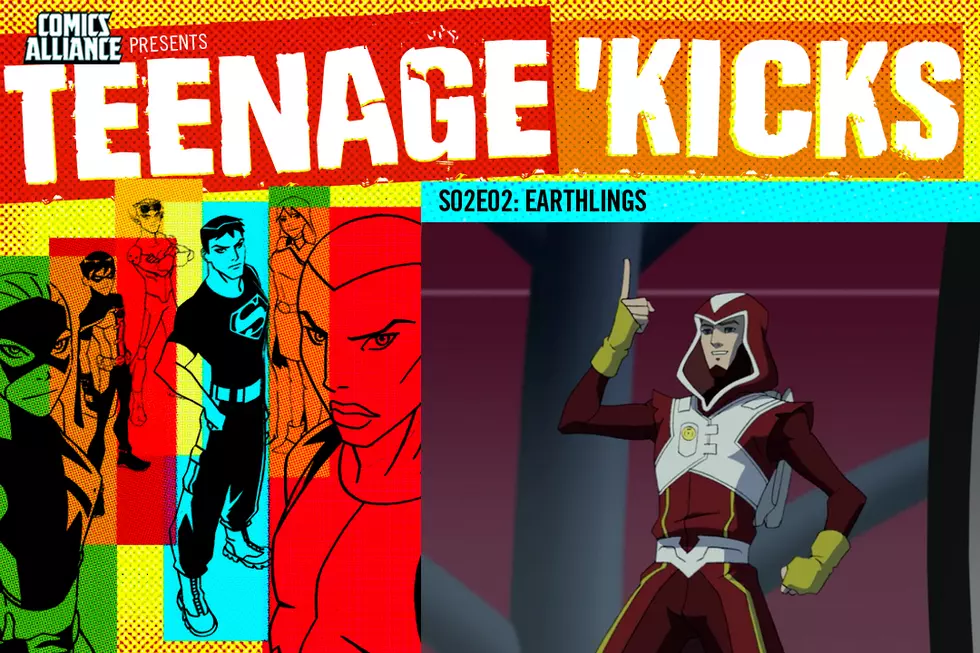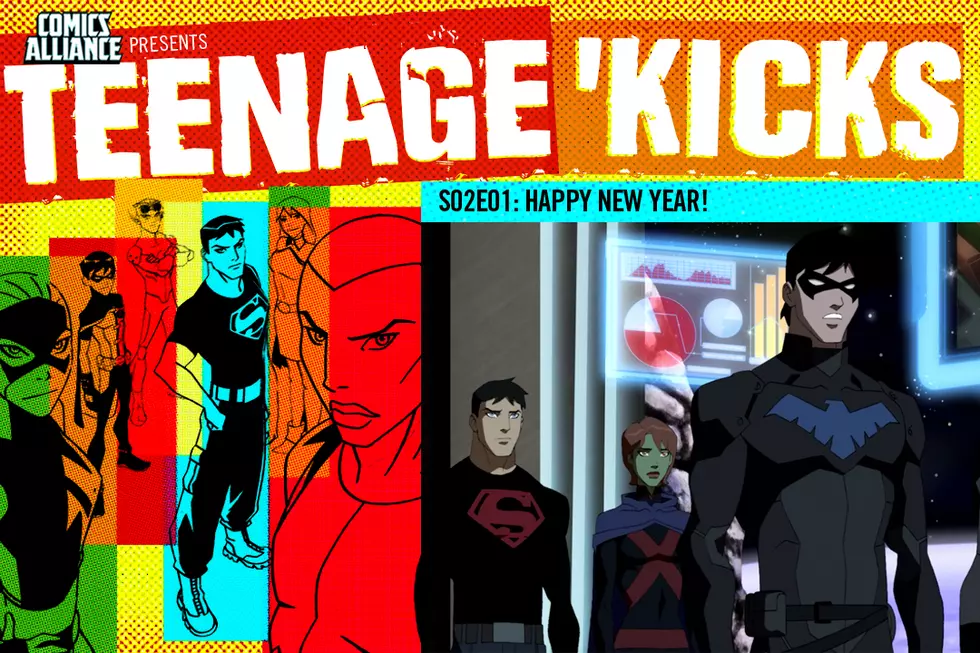‘Teen Titans Go’ Producer Michael Jelenic On The ‘Young Justice’ Crossover And The Show’s Changing Voice
Over almost two years and over eighty episodes on the air, Cartoon Network’s Teen Titans Go has dropped its characters into a wide variety of different situations. They might go to the future, meet alternate versions of themselves, or die of old age. There are even songs.
Some critics have accused the show of being too silly, so in the episode debuting today, “Let’s Get Serious,” the Titans meet some of these critics in the form of Young Justice, the teen superhero team from their own, departed, animated show --- and they’re definitely not pleased with what they see. To battle their critics, the Titans grimace really hard until they too become incredibly serious, muscled, gritty one-liner-spouting versions of themselves.
We spoke to series producer Michael Jelenic about the crossover, bouncing criticisms back at detractors and pushing the show into even wider, weirder directions.
ComicsAlliance: How did the idea of the Young Justice/Teen Titans Go! Crossover start?
Michael Jelenic: You know, I think it sort of grew out of responding to internet hate for the show where people wanted our show to be more serious than it actually was, so we started to think, what would a more serious version of our show be, in our sort of voice, which obviously would be pretty ridiculous?
Once we decided to do an episode that sort of had our characters become “serious,” we thought it would be fun to bring in the Young Justice group because, you know, that’s another show that’s often sort of associated with our show for reasons I’m not entirely sure about. Just because, I think, they’re two shows on just opposite spectrums. One show is sort of character development, and dramatic plots, and it’s just… very well thought out. Our show is kind of silly and random, and so we thought it would be fun if the Young Justice group came in and sort of challenged our characters to be a little bit more serious, and see where that took us. That’s where that came from.
CA: Was it difficult to balance the tones of having basically two casts of characters in the episode? One, you mentioned, is character-driven, serious, serialized plots, and then Teen Titans Go, which had an episode about burritos vs. hamburgers?
MJ: To be fair, it’s not exactly the real Young Justice crew that’s visiting us. It’s sort of an exaggerated version of them so we’re able to spin them to our tone. The fun thing is that Khary Payton played Aqualad in that series and plays Cyborg in our series, so that was another reason we brought the two franchises together. To see him playing two completely different types of character was just sort of fun to see. But it wouldn’t necessarily be fair to say that we exactly portrayed him in the same way that [Young Justice creators] Brandon Vietti and Greg Weisman would have.
CA: Was there any pressure to try to match that tone, to “do right” by a show with a different fanbase?
MJ: No, I mean, our crew, and especially Aaron [Horvath], who’s the other producer… Young Justice – the animated version – is wholly the creation of Brandon and Greg. We wouldn’t even fool ourselves to think that we could pick up that mantle and do what they do as well as they do. It was really more about using those characters to poke fun at our show, to take the show that’s really respected for doing serious superheroes really well and take those characters, bring them to our show and mock our show for not being that. More than anything, we used them for that.
CA: I like the idea of exploring that, because as much as there’s --- as you mentioned and I’ve heard --- the argument that Teen Titans Go is too silly, it’s also ultimately a show that seems to use a relative lack of “strong” continuity to explore big consequences, like where characters die, or Robin solves crime and becomes old and filled with ennui. So I like the idea of the show exploring that in a different way with some weird, '90s superhero idea of what seriousness is.
MJ: Yeah, exactly. I mean, if we take an idea that a serious show would do, we totally try to turn it on its head and, subvert it in our sort of way. There’s a lot of weird ideas that are percolated through our series.
CA: Is it fun playing in the sandbox of that more “serious” '90s idea of superheroes as gritty and anti-heroic?
MJ: We sort of like poking fun at those sort of tropes, where everybody has to be so serious, and we just try to push it to the extreme of characters fighting over who drank whose juice, and just being super serious. There’s no laughs, there’s nothing, everything is a little bit of a crisis in something like those old school '90s versions of the characters. So we definitely had fun pushing it to the extreme, even further than, obviously, people ever did push it.
CA: It’s almost, from what I’ve seen, a John Kricfalusi idea of "extreme."
MJ: The way I would describe it is taking something the audience thinks they want --- everyone thinks they want a more serious version of the show --- and then giving it to them but making it so absurd, so extreme, that obviously, this is not what they had in mind. It’s just the biggest caricature of super-serious superheroes.
CA: Do you feel that the show has changed or grown as it’s gone on? Doing an episode like this two years in, as opposed to at the beginning? What are some things that you can do now or feel comfortable doing?
MJ: I think the show’s definitely changed. If you look at our early shows, they’re a little bit more middle-of-the-road, I would say. I mean, we did some good stuff early on but at the same time we weren’t really necessarily cognizant of what we were doing; we weren’t sure how it was going to be embraced.
But seeing that the show has done so well, it’s given us the confidence to take the show into even weirder places than we ever thought we would. This show is a million times weirder than I think we thought it was going to be when we started this. So, yeah, if anything, each season of the show we try to push the boundaries and see how far we can go.
A lot of times we go too far, and then we say, “Okay, that episode was too dark,” or, “That episode was too absurd,” or whatever, and we sort of pull back from there, but we have a lot of confidence right now and we like sort of just testing what we can do with these characters and putting them in situations, I suspect, no DC character has ever been in.
CA: Is there anything else you’d like to explore with the series as it goes on? Weird, other genres and ideas and situations?
MJ: Oh yeah. I mean, we’ve done so many episodes of this show so far, we’ve already completed a hundred episodes, and we probably have another hundred to go.
It’s hard to come up with ideas to fill all that, but it also gives us the freedom to try different things, so I think down the line you’re definitely going to see the show experiment in what exactly it can pull off. I think there’s nothing that’s really going to be off-limits just because we have so many episodes to fill, so what I thought was one show when we started has totally turned into something else. I think you can definitely expect us exploring all sorts of genres and situations.
More From ComicsAlliance


![MVP: Who Is The Greatest Teen Titans Member? [Poll]](http://townsquare.media/site/622/files/2017/03/Teen-Titans-Vote.png?w=980&q=75)





![Mattel’s DC Multiverse Expands to the Rebirth Era and More [Toy Fair 2017]](http://townsquare.media/site/622/files/2017/02/IMG_2726.jpg?w=980&q=75)
